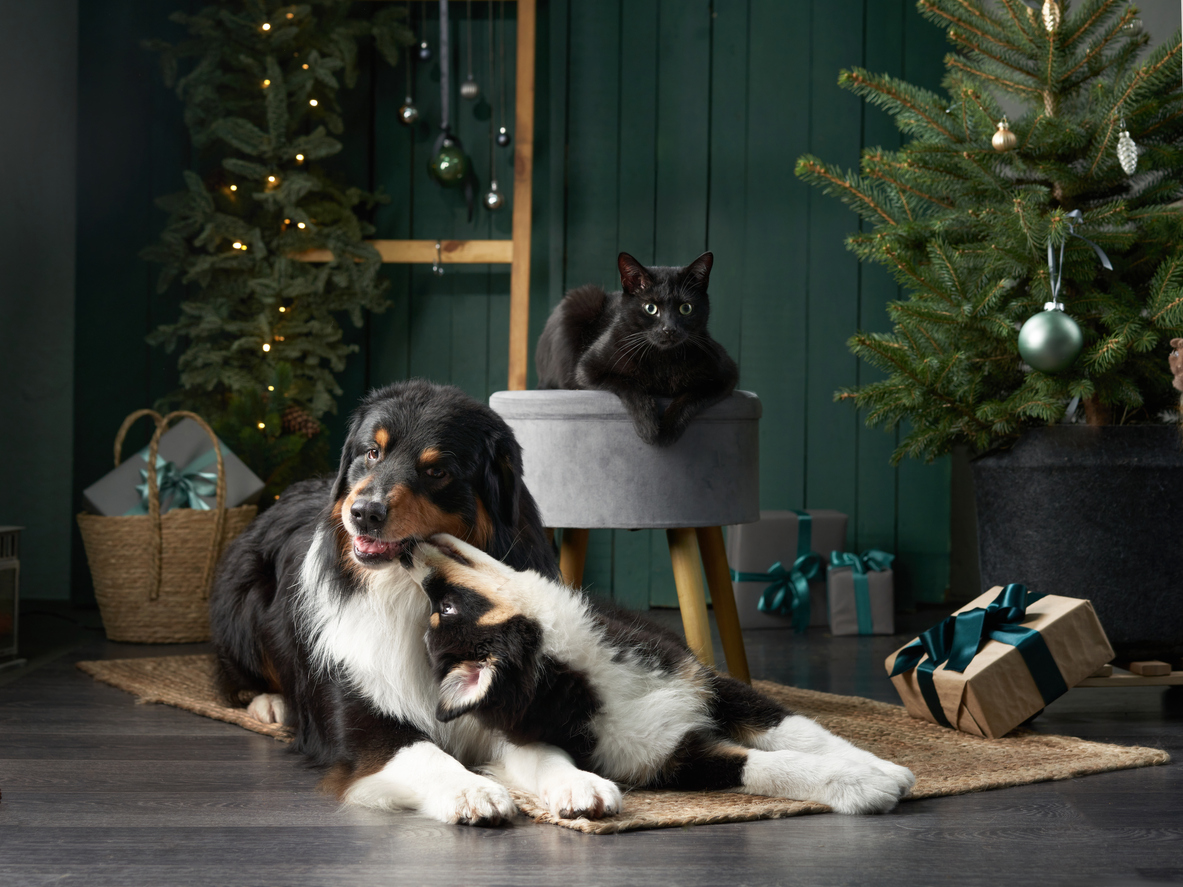The holiday season is a time for joy, celebration, and decorating, but it can also pose unexpected dangers for our pets. Many popular Christmas plants are toxic to cats and dogs, and pet owners need to be aware of the risks to keep their furry family members safe.
Common Toxic Holiday Plants for Pets
1. Poinsettia: Mildly Toxic but Risky
Poinsettias are one of the most iconic holiday plants, but they pose a threat to pets. While not as deadly as commonly believed, they can still cause mild toxicity, especially in cats and small dogs. The sap from the leaves can cause irritation, leading to symptoms such as:
- Drooling
- Vomiting
- Skin irritation
- Diarrhea
Though not life-threatening, it’s essential to keep poinsettias out of reach of curious pets.
2. Mistletoe: Highly Toxic to Pets
Mistletoe is often hung in homes as part of holiday traditions, but it poses a significant danger to pets, particularly dogs. Ingesting mistletoe can lead to severe toxicity due to its compounds called lectins and phoratoxins. Common symptoms include:
- Vomiting and diarrhea
- Abdominal pain
- Breathing difficulty
- Decreased heart rate
- Collapse and seizures (in severe cases)
If a pet ingests mistletoe, immediate veterinary attention is critical.
3. Holly: A Bitter and Dangerous Snack
Holly, with its glossy leaves and red berries, is another traditional Christmas decoration that poses risks to pets. Holly leaves contain saponins and methylxanthines, which are toxic to both dogs and cats. Ingesting even small amounts can cause:
- Drooling
- Lip-smacking
- Vomiting
- Abdominal pain
- Diarrhea
The berries are also toxic, and their spiny leaves can cause mechanical damage to the gastrointestinal tract.
4. Lilies: Deadly to Cats
While lilies are more commonly associated with Easter, they are sometimes included in Christmas floral arrangements. Lilies are extremely toxic to cats, with even small exposures, such as licking pollen off their fur, potentially causing fatal kidney failure. Signs of lily poisoning in cats include:
- Lethargy
- Vomiting
- Loss of appetite
- Kidney failure
Dogs are less sensitive to lilies but can still experience gastrointestinal upset if they ingest the plant.
5. Amaryllis: Toxic from Bulb to Bloom
The beautiful blooms of amaryllis plants make them a popular gift during the holiday season, but they are toxic to pets. The highest concentration of toxins is found in the bulb, but the entire plant is harmful. Symptoms of amaryllis poisoning in pets include:
- Drooling
- Vomiting
- Diarrhea
- Tremors
- Lethargy
6. Christmas Cactus: Generally Safe but Not Without Risk
The Christmas cactus is one of the few holiday plants that is not highly toxic to pets. While it is not poisonous, ingestion can still lead to minor gastrointestinal issues like vomiting and diarrhea, particularly in cats.
Safe Alternatives for Holiday Decor
For pet owners who want to keep their holiday decor both festive and pet-friendly, there are safer alternatives to the traditional Christmas plants. Consider using artificial versions of toxic plants or opting for non-toxic plants such as:
- Christmas Ferns
- Spider Plants
- Boston Ferns
These plants add greenery to your home without the risk to your pets’ health.
What to Do If Your Pet Eats a Toxic Plant
If you suspect that your pet has ingested any part of a toxic plant, quick action can make all the difference. Here are the steps to follow:
- Remove the plant: Safely remove any remaining plant material from your pet’s mouth.
- Check for symptoms: Monitor for any immediate signs such as vomiting, drooling, or difficulty breathing.
- Call a veterinarian: Contact your vet or a pet poison hotline for guidance. Be ready to describe the plant and your pet’s symptoms.
- Bring the plant to the vet: If possible, take a sample of the plant with you for identification when you go to the vet.
Conclusion
While holiday plants are beautiful, they can present serious risks to the health and safety of your pets. By recognizing which plants are dangerous and taking preventive measures, you can ensure a safe and joyful holiday season for everyone in your home, including your pets. Always consult your veterinarian if you suspect your pet has ingested a toxic plant, and consider using pet-safe alternatives to avoid any potential danger.
Yours in Paws,
The PawPaw Team

